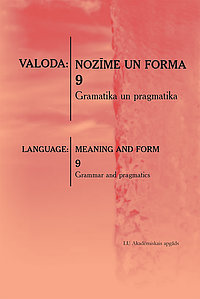Latviešu un čehu politiskā diskursa pragmatiskais konteksts
The pragmatic context of Latvian and Czech political discourse
Author(s): Nadežda KopolovecaSubject(s): Pragmatics, Politics and communication
Published by: Latvijas Universitātes Akadēmiskais apgāds
Keywords: political discourse; pragmatic context; the addressee; intersubjectivity; intereventuality; intertextuality;
Summary/Abstract: The paper is devoted to the issues related to the analysis of political discourse in terms of identifying the pragmatic context in the texts of the transcripts of the speeches of famous Latvian (Laimdota Straujuma, Ivars Godmanis, Valdis Dombrovskis) and Czech (Miroslava Němcová, Karel Schwarzenberg, Bohuslav Sobotka) politicians. As the most significant factors of the pragmatic context the addressee factor, the place factor, the time factor, the event factor and the factor of the phenomenon are identified. To influence its addressee and achieve the goal of the speech, the politicians use various appeals to names, events, phenomena that are significant for the nationʼs consciousness, and which allow to efficiently influence the audience. Politicianʼs methods include the actualization of information, the selection of advantageous facts (also known as agenda setting/agenda cutting), the nomination of the addressee, orientation in time and space, appeal to precedent names, events, phenomena. In the course of the analysis of the transcripts, the most frequent and characteristic factors of pragmatic context and stylistic devices of each of the selected politicians were revealed.
Journal: Valoda: nozīme un forma
- Issue Year: 2018
- Issue No: 9
- Page Range: 152-167
- Page Count: 16
- Language: Latvian

